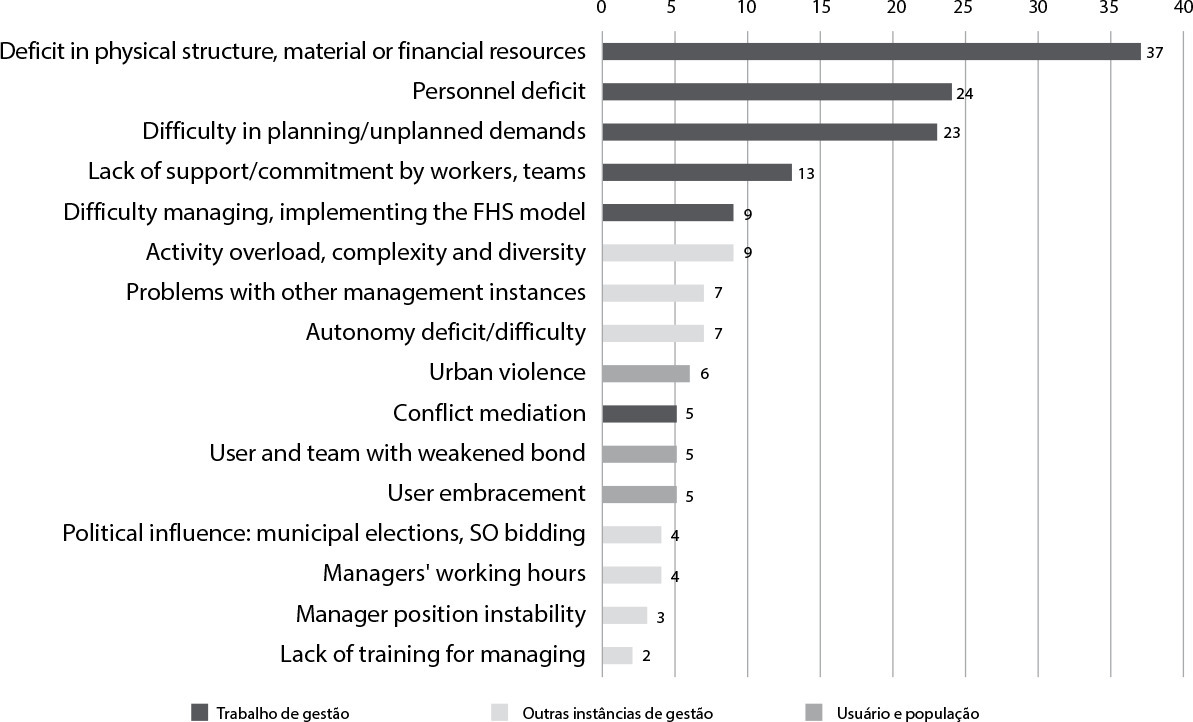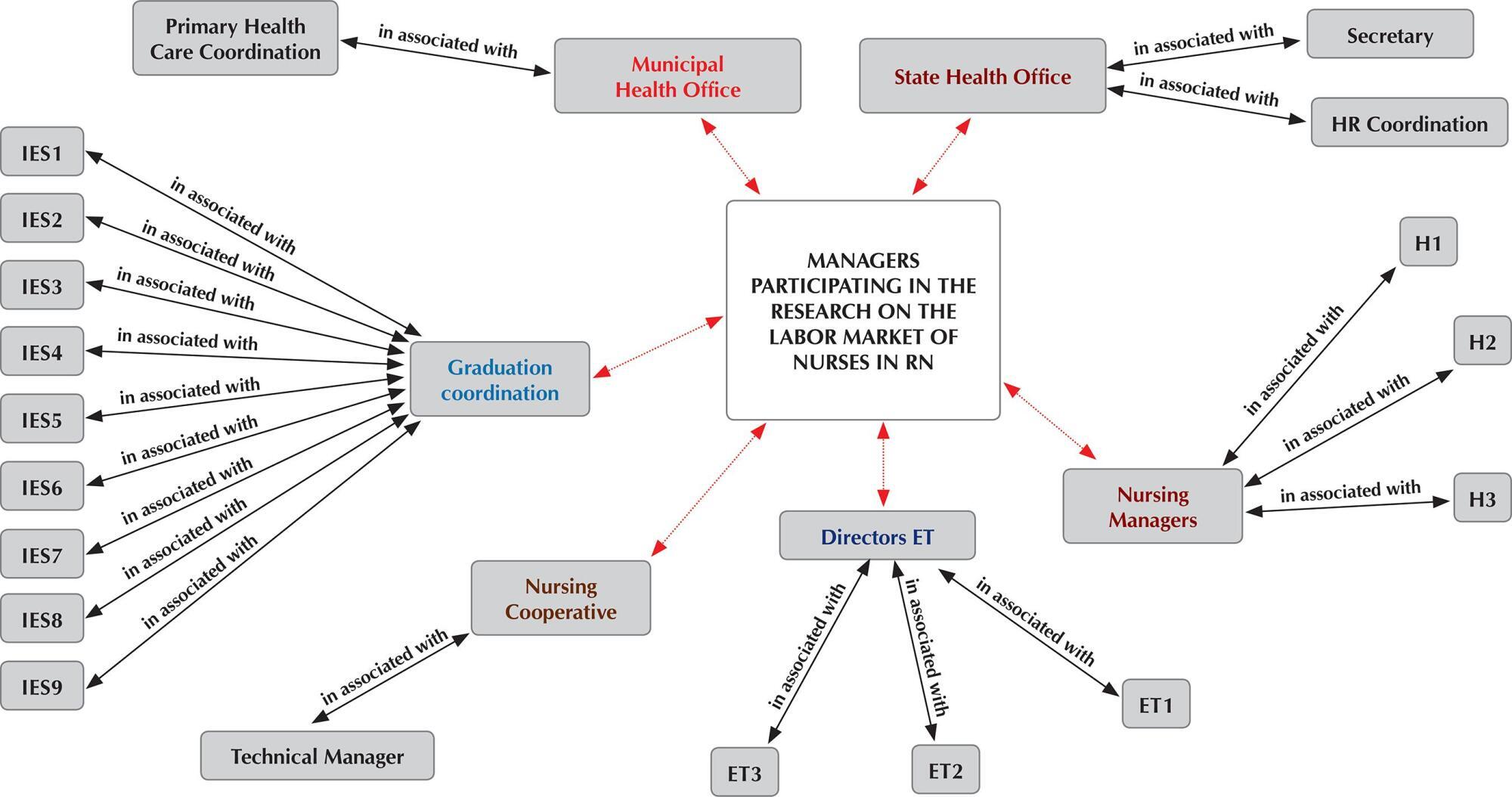-
ORIGINAL ARTICLE
Management in the Family Health Strategy: workloads and structured institutional violence
Revista Brasileira de Enfermagem. 2022;75(3):e20220071
10-21-2022
Resumo
ORIGINAL ARTICLEManagement in the Family Health Strategy: workloads and structured institutional violence
Revista Brasileira de Enfermagem. 2022;75(3):e20220071
10-21-2022DOI 10.1590/0034-7167-2022-0071
Visualizações0Ver maisABSTRACT
Objectives:
to understand the relationship between workloads and institutional violence in Family Health Strategy managers’ practice.
Methods:
qualitative research using theoretical triangulation and data from semi-structured interviews. Participants were 35 managers of Basic Health Units in the five Regions of Brazil, who worked in the Family Health Strategy. We used thematic analysis and ATLAS.ti for data analysis.
Results:
workloads were analyzed, showing relationships with institutional violence. Thematic categories emerged: “related to the management work itself”; “related to other instances of health system management”; “related to users and community”. There was an interrelationship between increased managers’ workloads and institutional violence.
Final Considerations:
the Family Health Strategy is relevant for universal access to health and requires favorable institutional conditions for its effectiveness. Adverse scenarios lead to increased workloads, approaching institutional violence.

-
ORIGINAL ARTICLE
Conflict management strategies used by Portuguese nurse managers
Revista Brasileira de Enfermagem. 2020;73(suppl 6):e20190336
10-28-2020
Resumo
ORIGINAL ARTICLEConflict management strategies used by Portuguese nurse managers
Revista Brasileira de Enfermagem. 2020;73(suppl 6):e20190336
10-28-2020DOI 10.1590/0034-7167-2019-0336
Visualizações0Ver maisABSTRACT
Objectives:
to analyze the perception and conflict management strategies used by nurses in the management of people in Portuguese health services.
Methods:
descriptive, correlational study, carried out in Portuguese health services, with an intentional non-probabilistic sample, totaling 95 nurse managers. A questionnaire and Conflict Management Scale were used, analyzing the variables of managerial activities and conflict management, with the aid of software.
Results:
it was identified that 60% of the managers, report having to mediate conflicts daily, and the majority report adopting dialogue in conduct. However, through the Kruskal-Wallis test, it was shown that enforcement strategies in conflict management prevail (p = 0.008), with collaborative ones being more restricted to monthly intervals (p = 0.049).
Conclusions:
managers perceive the importance of collaboration in the mediation of conflicts, however, in their daily lives; they tend to maintain imposing behaviors, signaling for a little transformational leadership style.

-
RESEARCH
Trends in the job market of nurses in the view of managers
Revista Brasileira de Enfermagem. 2018;71(1):148-155
01-01-2018
Resumo
RESEARCHTrends in the job market of nurses in the view of managers
Revista Brasileira de Enfermagem. 2018;71(1):148-155
01-01-2018DOI 10.1590/0034-7167-2016-0103
Visualizações0Ver maisABSTRACT
Objective:
to identify and interpret the main trends of the labor market for nurses in Rio Grande do Norte, based on the opinion of managers of training institutions and employers.
Method:
Data were collected through interviews with key informants, organized using Atlas.ti software resources and examined under the thematic content review.
Results:
the study showed six trends in the labor market of nurses: availability of professionals to the market; worsening working conditions with precariousness; indication for insertion in employment; unemployment for nurses; shortage of nurses; and the existence of a cooperative of nursing professionals.
Final considerations:
the current scenario of growth in the number of registered nurses without the expansion of the job supply has remained, unemployment tends to increase and work conditions will worsen.




